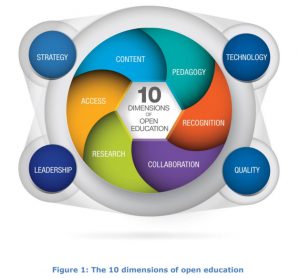The themes of Module 2 are of great relevance for my ongoing project of creating an open course on smart cities for city officials (see The open access course “Smart cities for city officials”).
Open access courses and MOOCs are still rarely provided by MAU and the Department of Urban Studies in particular. There are no official routines about this at MAU and therefore I found the Report from the European Commission Opening up education. A support framework for higher education institutions. as a meaningful starting point to position our course into broader HE strategies.
The report is the final outcome of the OpenEdu Project, that is a EU project aiming at exploring cases and formulating a framework of strategies for “Opening up Education” using digital technologies, in order “to widen access and participation to everyone by removing barriers and making learning accessible, abundant, and customisable for all” (Dos Santos, A., Punie, Y., Munoz, J., 2016. p.3).
This Framework identifies 10 dimensions of open education, illustrated in figure 1:

The CORE DIMENSIONS of open education are:
- Access: “the removal or lowering of economic, technological, geographical and institutional barriers which obstruct the doorway to knowledge. It grants permission to learners to engage with educational content (…)”
- Content: “materials for teaching and learning, and research outputs, which are free of charge and available to all.”
- Pedagogy: “the use of technologies to broaden pedagogical approaches and make the range of teaching and learning practices more transparent, sharable and visible.”
- Recognition: it has “two meanings: a) it is the process, usually carried out by an accredited institution, of issuing a certificate, diploma or title which has formal value; b) it is also the process of formally acknowledging and accepting credentials, such as a badge, a certificate, a diploma or title issued by a third-party institution. These credentials should attest that a set of learning outcomes (e.g. knowledge, know-how, skills and/or competences) achieved by an individual has been assessed by a competent body against a predefined standard.”
- Collaboration: “connecting individuals and institutions by facilitating the exchange of practices and resources with a view to improving education. By collaborating around and through open educational practices, universities can move beyond the typical institutional collaboration patterns and engage individuals and communities to build a bridge between informal, nonformal and formal learning.”
- Research: “removing barriers to access to data and research outputs, and also about broadening participation in research.”
The open access course “Smart cities for city officials”, to some extent comparable with a MOOC, will have a specific target group of learners, i.e. city officials, and the attempt is to “developing the design for learning so that it widens participation and collaboration between all involved.” We have a pedagogical approach with an emphasis on the learner, a key strategy for open learning identified by Dos Santos, et al. (2016) in the “pedagogy” dimension.
We will also work on dimension 6. Research. Our aim however, goes beyond the idea of openness in education as simple “access” to given resources. Our effort is to translate existing research in a pedagogical language that bypasses academic jargon and lengthy publications, as we have assessed that out target learners, i.e. city officials, do not have the time to go through lengthy and often complicated academic texts. We will compose video- and audio- lectures with interviews with leading scholars in the field of Smart cities, where we asked them to summarise their research findings in accessible language and engage in recommendations and tips for practitioners and decision-makers. By so doing, we wish also to “move beyond the typical institutional collaboration patterns and engage individuals and communities to build a bridge between informal, nonformal and formal learning” (5. Collaboration) and to create ad-hoc channels for knowledge exchanges between academia and civic stakeholders.
References:
Dos Santos, A., Punie, Y., Munoz, J. (2016). Opening up education. A support framework for higher education institutions. European Commission JRC Science for Policy Report.
